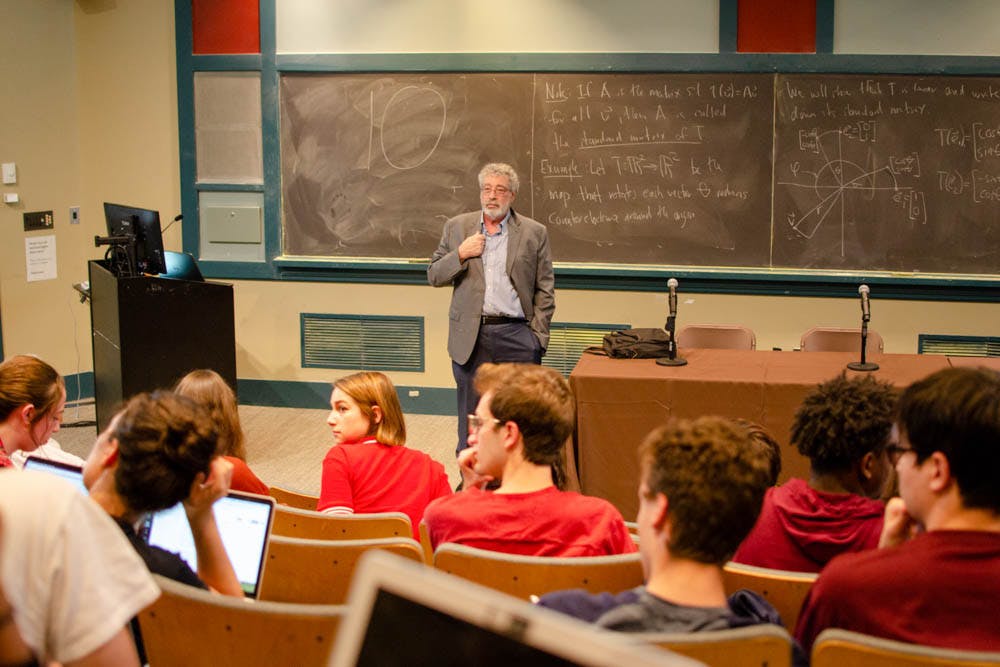A new working group of faculty, staff and students will seek to amend a former proposal to replace the Advisory Committee on Corporate Responsibility in Investment Policies, said James Morgan, chair of the Faculty Executive Committee, at a community forum yesterday.
The FEC clarified at the meeting that the original, controversial proposal to replace ACCRIP with an “Advisory Committee on University Resource Management” is no longer under consideration. ACCRIP handles issues of “moral responsibility” in the University’s investment policies.
The forum was co-sponsored by the FEC, the Undergraduate Council of Students and the Graduate Students Council.
The decisions come in response to community concerns about the proposal to replace ACCRIP with ACURM in May. The proposed replacement committee would have expanded on ACCRIP’s duties by “specifically (identifying) issues related to social responsibility with regard to the endowment, business practices, labor issues, gift acceptance and other related matters,” according to the proposed motion. Another proposed change includes the nomination process for faculty members. If ACURM had passed, candidates would have gone through a committee that consulted with President Christina Paxson P’19 — a break from ACCRIP’s policy, where faculty members are elected by other faculty.
The proposal drew opposition from student coalition Brown Divest, which criticized the proposal for shrinking the size of the committee, broadening its scope and giving Paxson more influence over the makeup of the committee. As a result, a faculty vote in May about replacing ACCRIP with ACURM was canceled, and the University scheduled the community forum to discuss the issue, The Herald previously reported. Brown Divest, a student coalition, calls on the University to divest from all companies “complicit in human rights abuses in Palestine,” according to its Facebook page.
Nancy Jacobs, professor of history and FEC member, addressed student concerns about ACURM at Tuesday’s forum. “We’re here now recognizing that that was not a good proposal,” she said. “As far as the FEC is concerned, that proposal is not on the table anymore. It’s up for grabs, we’re here now to talk about it, we’re here to listen to you.”
Ben Bienstock ’20, a member of Brown Divest present at the forum, was glad to learn that ACURM will not exist. But he still feels unsure that the final proposal will address the concerns of Brown Divest, which include transparency and divestment. “It was good to hear that that proposal is likely not what is being proposed,” Bienstock told The Herald. “While it was … relieving to hear that, we don’t necessarily have full faith that the administration is going to listen to our demands.”
Instead of moving forward with ACURM, faculty decided to create a working group made up of students, faculty and staff to draft a new proposal for a committee to replace ACCRIP. Jacobs said that she hopes to create a committee that will streamline faculty governance and have oversight of ethical issues concerning the University’s gift acceptance policies.
“What we’re trying to do is find a way to look together back at that proposal and come up with something that does not completely disregard the good things that ACCRIP has done, but perhaps streamline some of its running,” Jacobs said.
Paxson did not attend Monday’s forum because she did not want the discussion to become a “creature of the administration,” Morgan told The Herald Monday evening.
In a statement to The Herald, Brown Divest criticized Paxson’s absence, writing “Brown Divest is troubled by the absence of President Christina Paxson and Executive Vice President for Planning and Policy Russell Carey.” The statement also praised the University for scrapping ACURM.
“Brown Divest is glad to hear that last semester’s proposal for ACURM is no longer being considered in its previous form, yet is concerned with the administration’s continued efforts to expand and alter the responsibilities of ACCRIP,” the statement read. “We look forward to seeing increased transparency surrounding the proposed changes in the future.”
There have not yet been any concrete steps toward a working group, Morgan said. He added that the proposal for ACURM would likely serve as a “starting point” for a new proposal — meaning that the FEC, undergraduate students and graduate students will continue to communicate with each other.





